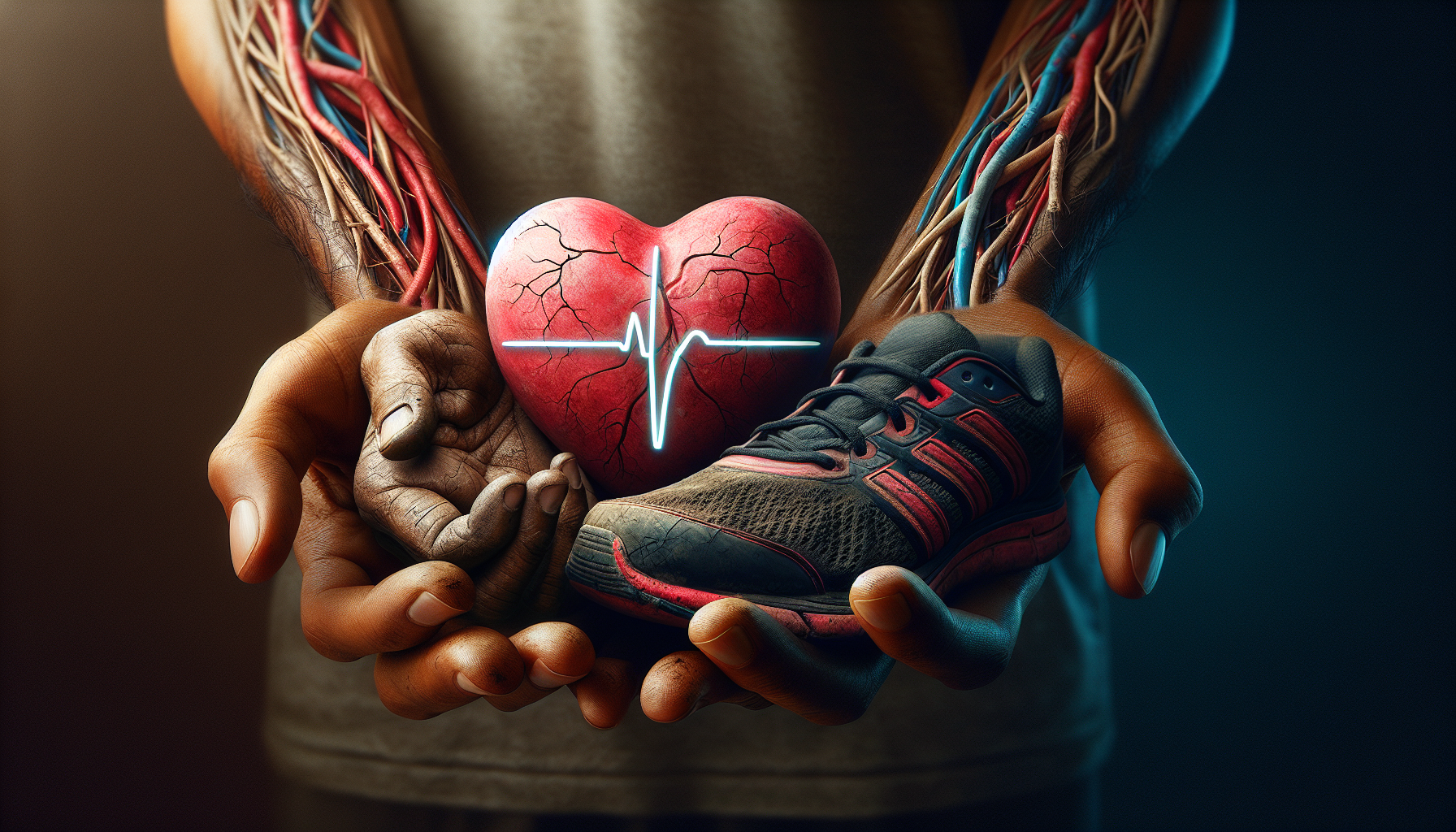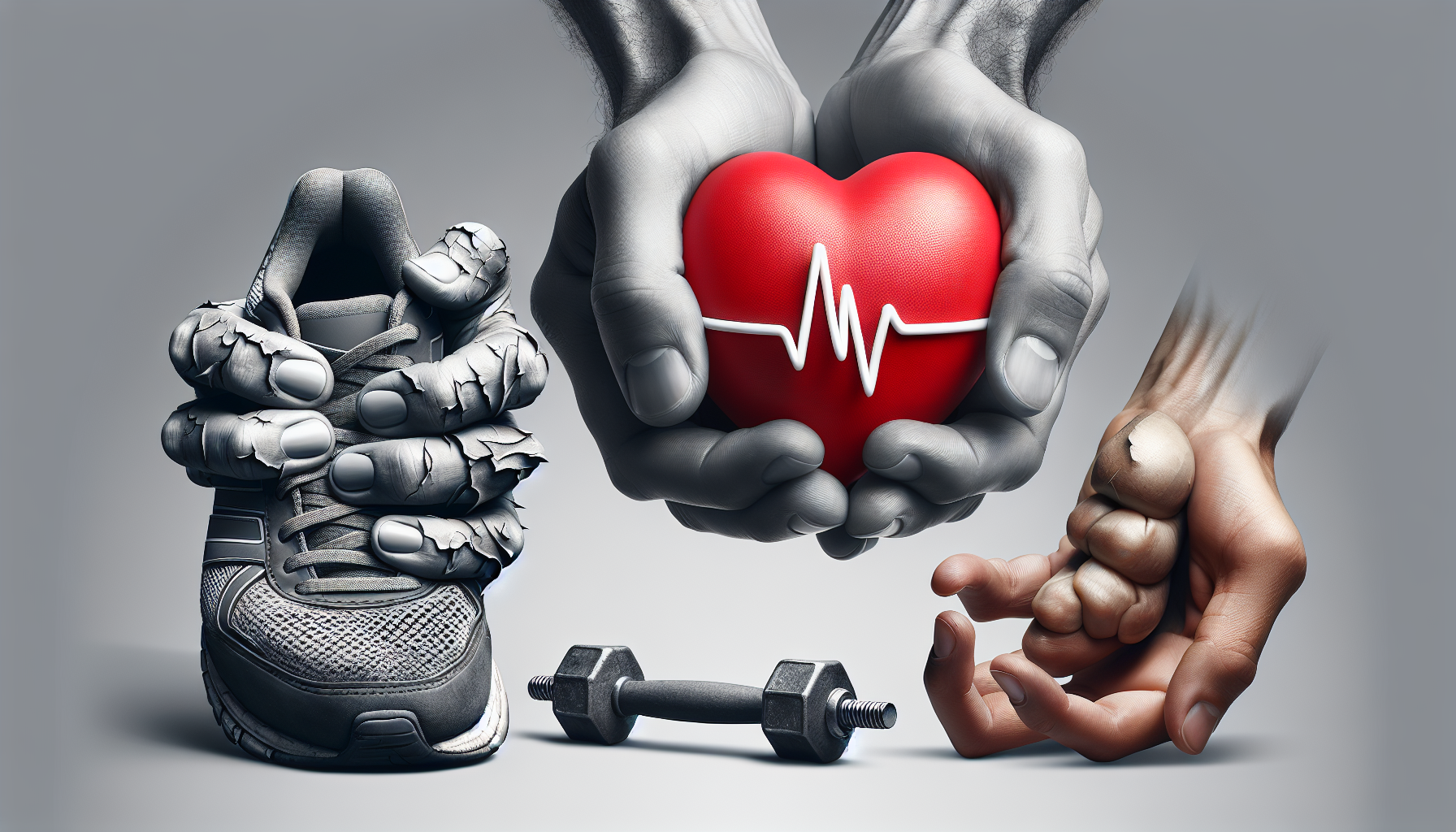Hey there! Are you a 30-year-old male wondering about common health issues that may crop up during this stage of your life? Well, you’ve come to the right place! In this article, we’ll explore some of the health problems that can affect men in their thirties. From changes in metabolism to increased stress levels, we’ll discuss how to tackle these challenges head-on and maintain a healthy lifestyle. So sit back, relax, and let’s dive into the world of health problems at 30 for males!
Cardiovascular Health Problems
High Blood Pressure
High blood pressure, also known as hypertension, is a common cardiovascular health problem that many men face by the age of 30. It occurs when the force of blood against the walls of your arteries is too high, putting extra strain on your heart. If left untreated, high blood pressure can lead to serious conditions such as heart disease, stroke, and kidney failure.
To effectively manage high blood pressure, it is important to make lifestyle changes such as maintaining a healthy weight, exercising regularly, reducing sodium intake, and avoiding excessive alcohol consumption. Additionally, your doctor may prescribe medications to help lower your blood pressure and protect your heart.
High Cholesterol
Having high cholesterol levels is another common cardiovascular health issue that affects many men in their 30s. When the levels of LDL cholesterol (bad cholesterol) are elevated, it can lead to the formation of plaque in your arteries, narrowing them and increasing the risk of heart disease and stroke.
To control high cholesterol, it is crucial to adopt a heart-healthy diet that is low in saturated fats and cholesterol. Regular exercise, quitting smoking, maintaining a healthy weight, and limiting alcohol intake are also essential. Medications like statins may be prescribed by your doctor to help lower your cholesterol levels if necessary.
Heart Disease
Heart disease is a broad term that encompasses various conditions that affect the heart, including coronary artery disease, arrhythmias, and heart failure. By the age of 30, some men may already have developed early signs of heart disease, such as chest pain or shortness of breath.
Preventing heart disease involves making healthy lifestyle choices. It is important to eat a balanced diet, exercise regularly, quit smoking, monitor blood pressure and cholesterol levels, manage stress, and limit alcohol intake. Regular check-ups with your healthcare provider can also help identify any potential risks or early signs of heart disease, allowing for timely intervention and management.
Sexual Health Issues
Erectile Dysfunction
Erectile dysfunction (ED) is a common sexual health issue that can affect men in their 30s. It refers to the inability to achieve or maintain an erection sufficient for sexual activity. Factors such as stress, anxiety, depression, underlying health conditions, and certain medications can contribute to ED.
Treatment for erectile dysfunction may vary depending on the underlying cause. Lifestyle changes, such as maintaining a healthy weight, exercising regularly, reducing stress, and avoiding tobacco and excessive alcohol use, can help improve erectile function. Additionally, medications, vacuum erection devices, counseling, and in some cases, surgery may be recommended by a healthcare professional.
Low Testosterone
Low testosterone levels, also known as hypogonadism, can occur in men as they age, including those in their 30s. Symptoms of low testosterone may include fatigue, reduced sex drive, erectile dysfunction, depression, and decreased muscle mass.
If you suspect low testosterone, it is important to consult with a healthcare professional who may order blood tests to assess your hormone levels. Treatment options may include testosterone replacement therapy, lifestyle modifications such as weight loss and exercise, and managing underlying conditions that contribute to low testosterone.
Infertility
Infertility is not only a concern for women but can also affect men in their 30s. Several factors can contribute to male infertility, including low sperm count, poor sperm motility, blockages, hormonal imbalances, and underlying medical conditions.
If you and your partner are struggling to conceive, seeking medical advice from a fertility specialist is recommended. They can conduct tests to identify the cause of infertility and discuss appropriate treatment options. Treatments may include lifestyle changes, medications, surgery, or assisted reproductive technologies such as intrauterine insemination (IUI) or in vitro fertilization (IVF).

Mental Health Disorders
Anxiety
Anxiety is a common mental health disorder that can affect men at any age, including their 30s. It is characterized by excessive worry, fear, and apprehension that can interfere with daily life. Symptoms of anxiety may include restlessness, irritability, difficulty concentrating, muscle tension, and sleep disturbances.
If you are experiencing persistent anxiety that affects your well-being and daily functioning, it is important to seek help from a mental health professional. They can provide various treatment options, including therapy (such as cognitive-behavioral therapy), medications, and stress management techniques.
Depression
Depression is a mood disorder that can impact men in their 30s, leading to persistent feelings of sadness, loss of interest in activities, changes in appetite and sleep patterns, difficulty concentrating, and thoughts of self-harm or suicide.
If you are experiencing symptoms of depression, it is essential to reach out to a healthcare professional or mental health provider. They can assess your condition and recommend suitable treatment options, which may include therapy (such as cognitive-behavioral therapy), medication, lifestyle changes, and support groups.
Substance Abuse
Substance abuse, including alcohol and drug addiction, can have a significant impact on mental health. It can contribute to or exacerbate mental health disorders such as anxiety and depression. Substance abuse problems can arise at any age, including in your 30s.
If you are struggling with substance abuse, it is crucial to seek help from healthcare professionals or addiction specialists. Treatment may involve detoxification, counseling, support groups, and in some cases, medications to aid in recovery. Seeking support from loved ones and making lifestyle changes can also be beneficial.
Musculoskeletal Problems
Back Pain
Back pain is a common musculoskeletal issue that can affect men in their 30s, often caused by poor posture, sedentary lifestyle, lifting heavy objects, or underlying conditions such as herniated discs or muscle strains.
To alleviate back pain and prevent further complications, it is important to maintain good posture, engage in regular exercise to strengthen your core and back muscles, practice proper lifting techniques, and avoid prolonged sitting or standing. In some cases, physical therapy, pain management techniques, and medications may be recommended by a healthcare professional.
Joint Pain
Joint pain, often caused by conditions such as osteoarthritis, gout, or injuries, can be troublesome for men in their 30s. It can affect various joints, including the knees, hips, shoulders, and hands, leading to discomfort, limited mobility, and reduced quality of life.
To manage joint pain, it is important to engage in regular low-impact exercise, maintain a healthy weight to reduce stress on the joints, use proper joint protection techniques during physical activities, and apply heat or cold therapy as directed. Over-the-counter pain relievers or prescription medications may also be recommended by your doctor to alleviate joint pain and inflammation.
Osteoporosis
Although osteoporosis is commonly associated with older adults, men in their 30s can also be affected. Osteoporosis is a condition characterized by low bone density, making the bones more fragile and prone to fractures.
To promote healthy bones and reduce the risk of osteoporosis, it is important to engage in weight-bearing exercises, consume a diet rich in calcium and vitamin D, avoid smoking and excessive alcohol consumption, and ensure an adequate intake of essential nutrients. Your doctor may also recommend bone density testing and prescribe medications if necessary.

Obesity and Weight-Related Concerns
Weight Gain
Weight gain is a common concern for many men, especially as they approach their 30s. Unhealthy eating habits, sedentary lifestyle, excessive alcohol consumption, and stress can contribute to unwanted weight gain.
To maintain a healthy weight, it is important to adopt a balanced diet that is rich in fruits, vegetables, lean proteins, and whole grains. Regular physical activity, including both cardiovascular exercises and strength training, is also crucial for weight management. Consulting with a registered dietitian or healthcare professional can provide personalized guidance and support.
Metabolic Syndrome
Metabolic syndrome is a cluster of conditions that occur together and increase the risk of heart disease, stroke, and diabetes. It includes high blood pressure, high blood sugar, high cholesterol levels, and excess abdominal fat.
To prevent or manage metabolic syndrome, lifestyle changes are essential. These changes may include losing weight if necessary, engaging in regular physical activity, adopting a heart-healthy diet, quitting smoking, and managing stress. Your doctor may also prescribe medications to control individual components of metabolic syndrome if needed.
Diabetes
Diabetes, particularly type 2 diabetes, is a significant health concern for men in their 30s. It occurs when your body cannot effectively use insulin or does not produce enough insulin, leading to high blood sugar levels.
Preventing or managing diabetes involves adopting a healthy lifestyle. This includes maintaining a balanced diet, engaging in regular physical activity, achieving and maintaining a healthy weight, monitoring blood sugar levels, and taking prescribed medications or insulin as directed. Regular check-ups with your healthcare provider are essential for monitoring and managing diabetes effectively.
Cancer Risks
Prostate Cancer
Prostate cancer is a common cancer that affects men, particularly as they age. While the risk of prostate cancer increases with age, some men in their 30s may also be at risk, especially if they have a family history of the disease.
To detect prostate cancer early, regular check-ups with a healthcare provider are crucial. This may involve a prostate-specific antigen (PSA) blood test and a digital rectal exam (DRE). Understanding your risk factors and discussing them with your doctor can help determine if further screening or monitoring is necessary.
Testicular Cancer
Testicular cancer is a relatively rare but potentially dangerous cancer that primarily affects young men, including those in their 30s. Regular self-examinations can help in detecting any abnormalities such as lumps or swelling in the testicles.
If you notice any changes or abnormalities, it is important to consult with a healthcare professional as soon as possible. Early diagnosis and treatment can significantly improve the outcomes for testicular cancer.
Colorectal Cancer
Colorectal cancer, including colon and rectal cancer, can affect men in their 30s, although it is more commonly diagnosed in older individuals. Lifestyle factors such as poor diet, sedentary behavior, obesity, and smoking can increase the risk of developing colorectal cancer.
To reduce the risk of colorectal cancer, it is important to maintain a healthy lifestyle. This includes consuming a diet rich in fiber, fruits, and vegetables, engaging in regular physical activity, limiting red and processed meat consumption, quitting smoking, and moderating alcohol intake. Regular screening tests, such as colonoscopies, are also recommended, particularly for individuals with a family history of the disease.

Respiratory Issues
Asthma
Asthma, a chronic respiratory condition, can affect men of all ages, including those in their 30s. It is characterized by recurrent episodes of wheezing, coughing, chest tightness, and shortness of breath.
If you experience symptoms of asthma, it is important to seek medical attention and consult with a healthcare professional. They can provide an accurate diagnosis, develop an individualized management plan, and prescribe appropriate medications. Avoiding triggers such as allergens or irritants, maintaining good air quality in your home, and having a written asthma action plan can help control symptoms and prevent asthma attacks.
Chronic Obstructive Pulmonary Disease (COPD)
COPD is a progressive lung disease that can result from exposure to environmental toxins, such as cigarette smoke or occupational hazards. Although it is more commonly diagnosed in older individuals, the disease can develop in men in their 30s who have a history of smoking or long-term exposure to lung irritants.
If you are experiencing symptoms such as chronic coughing, wheezing, shortness of breath, or frequent respiratory infections, it is important to consult with a healthcare professional for an evaluation. Quitting smoking, avoiding exposure to lung irritants, and following prescribed treatments can help manage COPD symptoms and slow disease progression.
Lung Cancer
While lung cancer is commonly associated with smoking, it can also affect non-smokers, including men in their 30s. Lung cancer symptoms may include persistent cough, wheezing, chest pain, weight loss, and recurring respiratory infections.
If you are experiencing symptoms that could be indicative of lung cancer, it is crucial to seek medical attention promptly. A healthcare professional can perform diagnostic tests, such as imaging scans and biopsies, to determine the presence of cancer and develop an appropriate treatment plan. Quitting smoking, avoiding secondhand smoke, and reducing exposure to environmental toxins are essential for preventing or reducing the risk of lung cancer.
Digestive Problems
Gastroesophageal Reflux Disease (GERD)
GERD is a digestive disorder in which stomach acid flows back into the esophagus, causing symptoms such as heartburn, regurgitation, chest pain, and difficulty swallowing. It can affect men of all ages, including those in their 30s.
To manage GERD, lifestyle modifications are important. This may include avoiding trigger foods, eating smaller meals, not lying down immediately after eating, maintaining a healthy weight, and elevating the head of the bed while sleeping. Over-the-counter antacids or prescription medications may also be recommended by your doctor to alleviate symptoms and reduce acid production.
Irritable Bowel Syndrome (IBS)
IBS is a common digestive disorder that can cause recurrent abdominal pain, changes in bowel movements, bloating, and discomfort. It can affect men in their 30s and significantly impact their quality of life.
If you suspect you have IBS, it is important to consult with a healthcare professional for an accurate diagnosis and individualized management plan. Treatment for IBS often involves dietary changes, stress management techniques, medications, and lifestyle modifications to reduce symptoms and improve overall well-being.
Peptic Ulcers
Peptic ulcers are open sores that develop in the lining of the stomach, upper small intestine, or esophagus. They can be caused by a bacterial infection, prolonged use of nonsteroidal anti-inflammatory drugs (NSAIDs), excessive alcohol consumption, or smoking.
If you suspect you have a peptic ulcer, seeking medical attention is important. Treatment may involve medications to reduce stomach acid, antibiotics if necessary for bacterial infection, and lifestyle modifications such as avoiding trigger foods and limiting alcohol and tobacco use. Regular follow-up visits with a healthcare professional can help monitor the healing process and prevent complications.

Sleep Disorders
Insomnia
Insomnia is a sleep disorder characterized by difficulty falling asleep, staying asleep, or experiencing non-restorative sleep. It can affect men of all ages, including those in their 30s, and can significantly impact daily functioning and overall well-being.
If you are experiencing persistent insomnia, it is important to consult with a healthcare professional or sleep specialist. They can help identify the underlying causes and develop a personalized treatment plan. Treatment options may include improving sleep hygiene, cognitive-behavioral therapy for insomnia (CBT-I), and, in some cases, medications to aid in sleep.
Sleep Apnea
Sleep apnea is a sleep disorder characterized by pauses in breathing or shallow breathing during sleep. It can lead to daytime sleepiness, fatigue, and an increased risk of cardiovascular problems. Men in their 30s can be at risk for sleep apnea, particularly if they are overweight, have a family history, or have other risk factors such as smoking or alcohol use.
If you suspect you have sleep apnea, it is important to speak with a healthcare professional or sleep specialist. They may recommend a sleep study to diagnose the condition accurately. Treatment options for sleep apnea may include continuous positive airway pressure (CPAP) therapy, lifestyle changes, positional therapy, or, in severe cases, surgical interventions.
Restless Leg Syndrome
Restless Leg Syndrome (RLS) is a neurological disorder characterized by an irresistible urge to move the legs, often accompanied by uncomfortable sensations. RLS can cause sleep disturbances and impact overall quality of life, including men in their 30s.
If you suspect you have RLS, it is important to consult with a healthcare professional for an accurate diagnosis. Treatment options for RLS include lifestyle modifications, such as regular exercise and avoiding caffeine or tobacco, as well as medications to manage symptoms. Discussing with a healthcare professional can help determine the best approach for managing RLS and improving sleep quality.
Kidney and Urinary Tract Issues
Kidney Stones
Kidney stones are solid mineral and salt deposits that form in the kidneys and can cause severe pain when they pass through the urinary tract. Men in their 30s can develop kidney stones due to various factors, including dehydration, certain diets, metabolic disorders, or family history.
If you suspect you have kidney stones, it is important to seek medical attention. Treatment options may include pain management, increasing fluid intake, medication to help pass the stones, or, in some cases, surgical interventions. Making lifestyle changes, such as staying hydrated and following a balanced diet, can help prevent the formation of kidney stones.
Urinary Tract Infections
Urinary Tract Infections (UTIs) can occur in men of all ages, including those in their 30s. Some common symptoms of UTIs include frequent urination, a persistent urge to urinate, burning or pain during urination, cloudy urine, and abdominal pain.
If you suspect you have a UTI, seeking medical attention is important to receive appropriate treatment. UTIs are typically treated with antibiotics prescribed by a healthcare professional. Drinking plenty of water, maintaining proper hygiene, and urinating before and after sexual activity may help prevent UTIs.
Benign Prostatic Hyperplasia (BPH)
Benign Prostatic Hyperplasia (BPH) is a non-cancerous enlargement of the prostate gland, which can cause urinary symptoms such as frequent urination, weak urine flow, difficulty starting or stopping urination, and waking up at night to urinate. BPH commonly affects men as they age, including those in their 30s.
If you are experiencing symptoms of BPH, it is important to consult with a healthcare professional. Treatment options may include medications to relieve symptoms, lifestyle changes such as limiting caffeine and alcohol intake, and in some cases, surgical interventions to reduce prostate size. Regular check-ups with your healthcare provider can help monitor the progression of BPH and adjust treatment as necessary.

